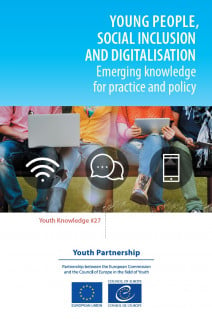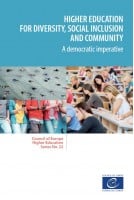Can the digital revolution help us to tackle existing inequalities, or does it leave some young people even further behind? Is the digital world equally accessible to all young people? What are some of the inherent inequalities within the digital sphere? Do digital tools enable youth organisations, youth workers or state bodies to “reach out” to marginalised young people?
Digital methods, tools and platforms, and their unexplored potential in the youth sector, have created much enthusiasm within the youth field. This Youth Knowledge publication explores the intersection between digitalisation and social inclusion of young people, reflecting especially on how digitalisation affects young people’s lives, and what the role of youth policy, youth work and youth research can be in this respect.
In these 16 chapters, the authors critically examine if and how digitalisation can support the quest for social inclusion, ranging from the exploration of policies, tools and platforms available to young people and youth workers in Europe, supporting young people’s access to education and employment opportunities, opening up avenues for digital youth work, providing opportunities for participation for young people with disabilities, channels of integration for migrant communities and young refugees across Europe and support networks for young LGBTI persons.
While there is an acknowledgement of the potential for the youth sector to use the possibilities of digitalisation to address social inequality, the authors also emphasise that this does not happen automatically, and more reflection is needed regarding the accessibility of technology and how our digital approaches can be made inclusive for young people from all backgrounds.
INTRODUCTION
Dan Moxon, Adina Marina Șerban, Dunja Potočnik, Lana Pasic and Veronica Ștefan
CHAPTER 1 – AN OVERVIEW OF SOCIAL INCLUSION, DIGITALISATION AND YOUNG PEOPLE
Adina Marina Șerban, Dan Moxon, Dunja Potočnik, Lana Pasic and Veronica Ștefan
CHAPTER 2 – A NEW ERA OF DIGITAL LEARNING IN DIGITALENTS HELSINKI: YOUTH PARTICIPATION IN THE LABOUR MARKET THROUGH HIGH-TECH PROJECTS
Karoliina Leisti and Vesa Jaakola
CHAPTER 3 – DIGITALISATION AND ICT AS A GUARANTEE FOR THE SOCIAL INCLUSION OF YOUNG PEOPLE WITH DISABILITIES
Roman Banari
CHAPTER 4 – DIGITALISATION FOR THE EMPOWERMENT OF INDIVIDUALS WITH VISUAL IMPAIRMENT OR BLINDNESS
Judit Gombás, Mária Magdolna Flamich and Mária Rita Hoffmann
CHAPTER 5 – LGBTILISATION: LEARNING FROM THE EXPERIENCES OF YOUNG LGBTQIA+ PEOPLE ONLINE
Dan Moxon, John Delap, Eli, Seán, Kajetan Koperski, Millica, Hélėne Mariaud, Lukas Reußner and Roberta
CHAPTER 6 – CAN OPENNESS AND OPEN STANDARDS HELP REVITALISE MARGINALISED LANGUAGES?
Subhashish Panigrahi
CHAPTER 7 – PRECARIOUS YOUTH AND THE SPECTRE OF ALGORITHMIC STEREOTYPING
Dan McQuillan and Ron Salaj
CHAPTER 8 – YOUNG PEOPLE’S DIGITAL WELL-BEING: OPTIMISING THE POTENTIAL AND MINIMISING THE RISKS
Cathy Street, Aiman El Asam and Adrienne Katz
CHAPTER 9 – WHATSAPP REFUGEES? A REFLEXIVE ACCOUNT OF THE METHODOLOGICAL USE OF WHATSAPP WITH NEWLY ARRIVED REFUGEES IN EUROPE
Daniel Briggs
CHAPTER 10 – “I’M THERE FOR YOU.” PEER AND WORKER SUPPORT THROUGH ONLINE MESSAGING
Ursula Curwen
CHAPTER 11 – VIRTUAL COMMUNITIES IN INTRA-EUROPEAN MOBILITIES AS MECHANISMS OF INTEGRATION AND SOCIAL EXCLUSION: THE NEW SPANISH MIGRATION IN EUROPE
Antía Pérez-Caramés, Belén Fernández-Suárez and Alberto Capote Lama
CHAPTER 12 – POWER, PARTICIPATION AND GEOGRAPHICAL ISOLATION
John Taylor, Anja Johnston and Rachael Hatfield
CHAPTER 13 – CODING PROMOTES THE SOCIAL PARTICIPATION OF YOUNG PEOPLE WITH DISABILITIES
Thomas Schmidt, Jutta Schneider and Katrin Schuberth
CHAPTER 14 – FROM DIGITAL SKILLS TO DIGITAL ETHICS: UNCOVERING THE POLITICS OF EXCLUSION AND EMPOWERING STRATEGIES OF SELF-INCLUSION IN DIGITAL ECOSYSTEMS
Björn Bohnenkamp and Lukas Findeisen
CHAPTER 15 – YOUNG PEOPLE, SOCIAL INCLUSION AND THE DIGITAL AGE: A HUMAN RIGHTS PERSPECTIVE
Nuala Connolly and James Kenny
CHAPTER 16 – MANAGING DIGITAL YOUTH WORK AND ITS RISKS
Lasse Siurala
AUTHOR BIOGRAPHIES
Télécharger un extrait (276.44k)









